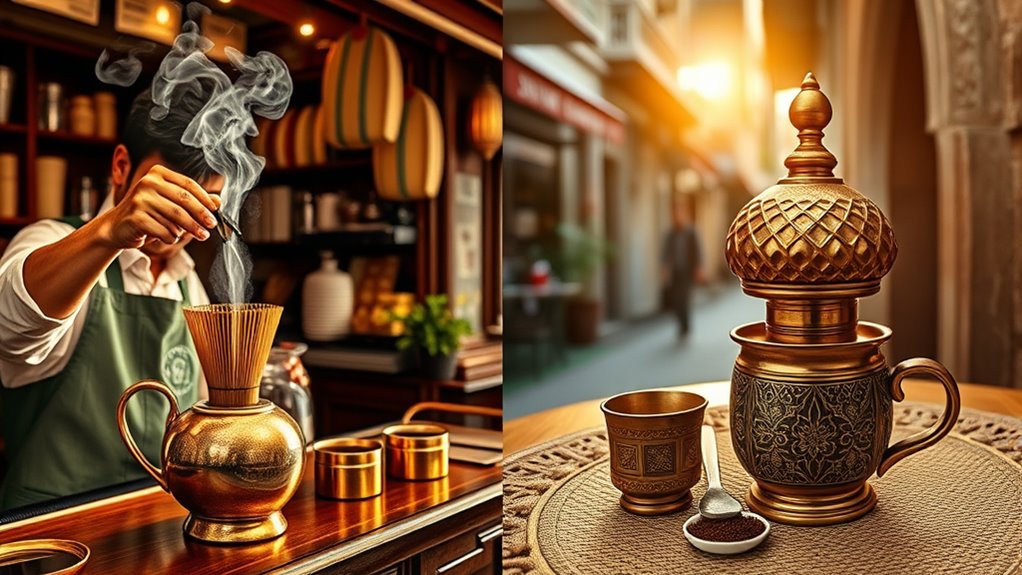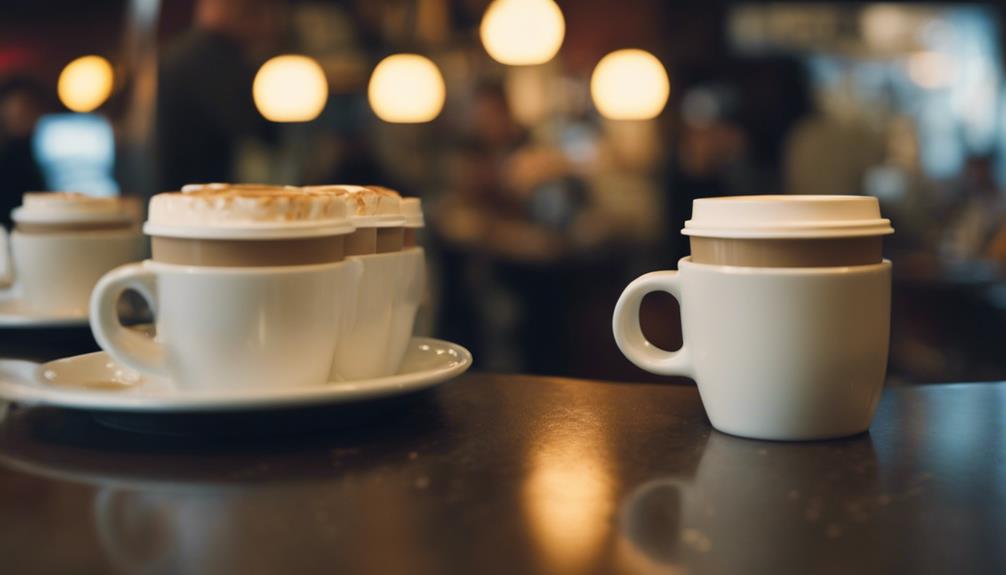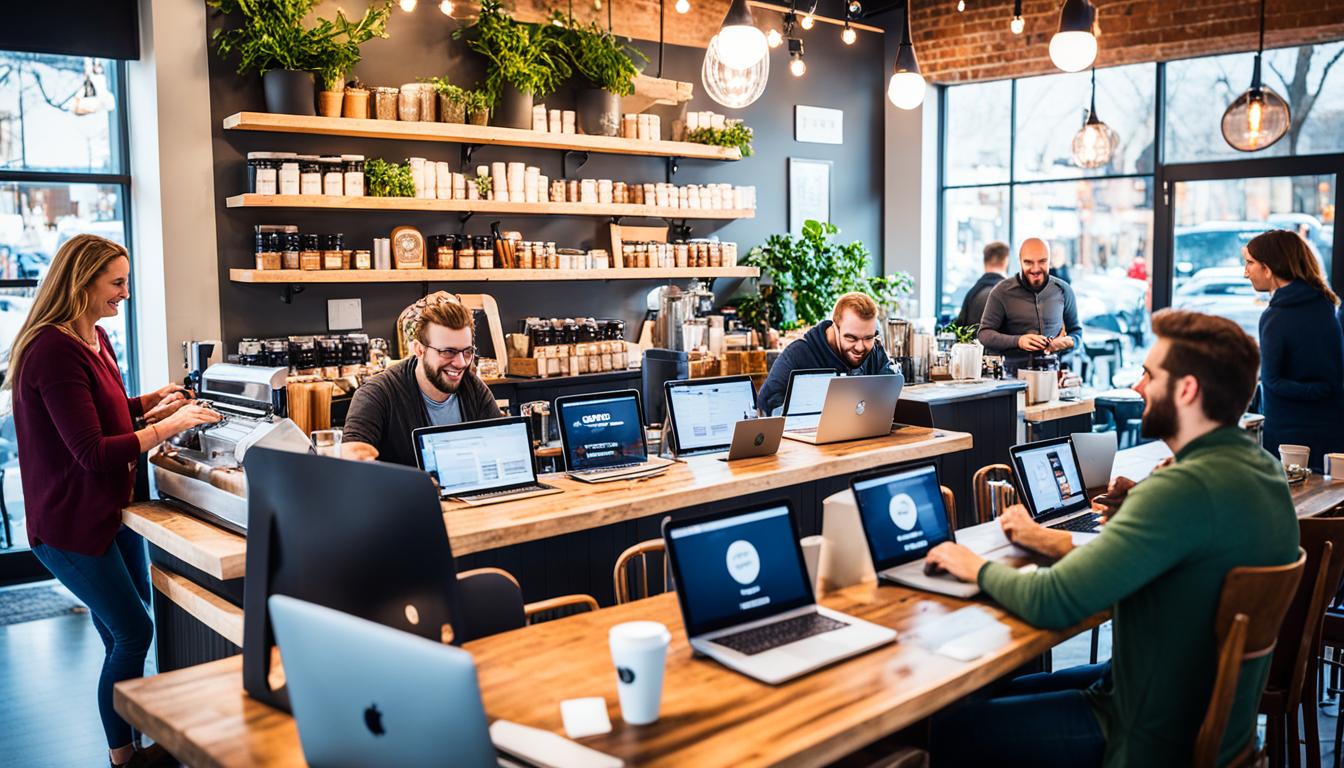Across the globe, coffee rituals reflect local history, values, and social bonds. From Italy’s precise espresso craft to Ethiopia’s warm coffee ceremonies, each tradition holds cultural significance. Scandinavian fika fosters community, while Middle Eastern customs showcase hospitality. Latin American celebrations highlight regional pride. These customs not only shape how communities enjoy coffee but also tell stories of identity and connection. If you keep exploring, you’ll discover even more fascinating examples of these rich traditions around the world.
Key Takeaways
- Different cultures have unique coffee preparation methods, such as Italy’s espresso, Turkey’s cezve brewing, and Ethiopia’s ceremonial coffee rituals.
- Coffee customs often symbolize hospitality, community, and social bonds, varying from Middle Eastern generosity to Scandinavian fika.
- Traditional practices reflect local history, climate, and values, showcasing coffee’s role as a cultural identity marker worldwide.
- Coffee sharing enhances social interactions, reinforcing hierarchies, respect, and connections across diverse societies.
- The diversity of brewing techniques and rituals illustrates coffee’s adaptability and significance across global regions.

Coffee is more than just a morning pick-me-up; it’s a deeply rooted tradition that varies widely around the world. Every culture has its own way of preparing and enjoying coffee, shaping social interactions and reflecting local history and values. The process of coffee preparation isn’t just about making a drink—it’s a ritual that carries cultural significance, often involving specific methods, equipment, and etiquette. For example, in Italy, the art of crafting a perfect espresso is revered, with baristas meticulously tamping grounds and pulling shots with precision. In Turkey, coffee preparation is a ceremonial affair, using finely ground beans boiled in a cezve, and often serving coffee alongside conversations or even fortune-telling. Meanwhile, in Ethiopia, coffee ceremonies involve roasting fresh beans over an open flame, grinding them by hand, and brewing small quantities in a jebena, emphasizing community and hospitality. These customs aren’t incidental; they embody cultural values and social bonds, transforming mere caffeine consumption into meaningful traditions.
Across different regions, coffee’s cultural significance is evident in how it’s integrated into daily life and special occasions. In Scandinavian countries like Sweden and Norway, coffee breaks known as “fika” are sacred; people pause their routines to enjoy coffee with friends or colleagues, often accompanied by pastries. This ritual fosters community and work-life balance, highlighting coffee’s role beyond sustenance. In Middle Eastern countries, coffee often symbolizes hospitality and generosity. Serving strong, spiced coffee to guests signifies respect and friendship, reinforcing social hierarchies and bonds. Similarly, in Latin America, coffee is woven into festivities and social gatherings, with specific brewing styles and serving customs that celebrate local heritage. Additionally, the high quality of coffee beans used in different regions enhances the flavor and cultural authenticity of these customs.
These diverse coffee traditions also influence how the beverage is perceived culturally. In many societies, coffee is more than a caffeine source—it’s an expression of identity and pride. The way a country approaches coffee preparation and consumption reflects its history, climate, and social fabric. Whether it’s the slow, ceremonial process of Ethiopian coffee or the quick, efficient espresso shot in Italy, each tradition tells a story. Additionally, the variety of brewing methods employed across cultures demonstrates how adaptable and multifaceted coffee’s role can be. As you explore these customs, you realize that coffee’s cultural significance extends far beyond its energizing effects. It’s a vessel for community, history, and shared experience, connecting people across borders through a simple, yet profound, act of brewing and sharing.
Frequently Asked Questions
How Did Coffee Originate in Different Cultures?
You might wonder how coffee originated in different cultures. The historical origins of coffee trace back to Ethiopia, where legend says a goat herder discovered its energizing effects. From there, coffee cultivation spread to the Arabian Peninsula, developing unique customs like the Middle Eastern coffee ceremony. In each culture, coffee’s roots highlight local traditions and adaptations, shaping diverse customs that continue to influence global coffee practices today.
What Are the Traditional Coffee Brewing Methods Worldwide?
Oh, you think brewing coffee is just about pressing a button? Think again! In Ethiopia, you’ll join a coffee ceremony that’s almost a ritual, while in Turkey, the cezve boils rich, thick brews. From French press to drip, each culture boasts unique brewing techniques. You get to savor traditions that turn simple coffee into a cultural celebration, proving that brewing is an art, not just a morning necessity.
How Do Coffee Customs Influence Social Interactions?
You notice that coffee customs shape social interactions by establishing specific coffee etiquette, which promotes respect and shared understanding. When you follow local customs, you foster social bonding and create a welcoming environment. Whether it’s sharing a cup in Italy or participating in a Turkish coffee ritual, these traditions encourage connection, making conversations warmer and more meaningful. Your awareness of coffee customs enhances your social experiences and deepens relationships.
Are There Any Unique Coffee-Related Festivals Globally?
Ever wonder if coffee can be a celebration? Absolutely! Around the world, you’ll find unique coffee-related festivals like Japan’s Coffee Festival showcasing stunning coffee art and Ethiopia’s coffee ceremonies emphasizing tradition. These festivals unite communities, celebrate culture, and deepen your appreciation for coffee’s artistry. Participating in or witnessing these events makes you feel connected and inspired. Isn’t it amazing how coffee can turn into a vibrant, cultural experience?
How Do Coffee Traditions Vary Between Urban and Rural Areas?
You’ll notice urban and rural areas have distinct coffee traditions due to differences in accessibility and culture. In cities, coffee shops thrive, offering diverse brews and social spots, while rural areas often rely on home brewing and local customs. Urban areas enjoy greater coffee accessibility, encouraging innovation and variety, whereas rural communities preserve traditional brewing methods. These differences shape how people connect over coffee, creating a rich tapestry of customs worldwide.
Conclusion
As you explore coffee traditions around the world, you see how each culture’s unique customs create a rich mosaic of flavors and rituals. While some savor a quick espresso, others cherish slow, communal ceremonies. It’s fascinating how a simple cup of coffee can connect people across continents, yet also reflect their distinct identities. So next time you sip your brew, remember—you’re part of a global story, blending tradition and modernity in every sip.









